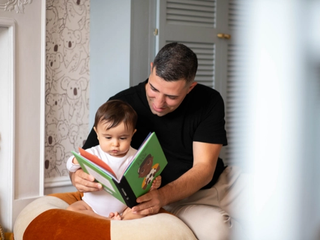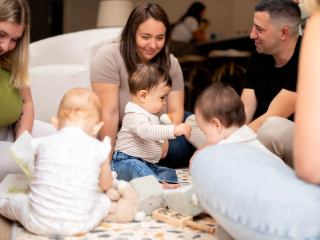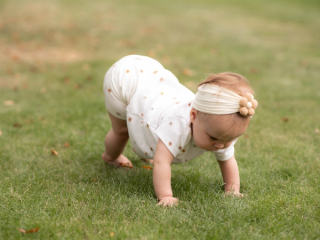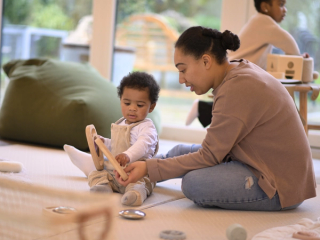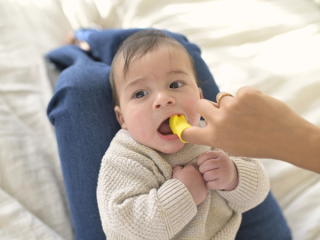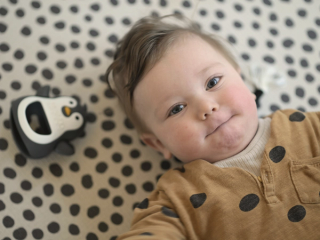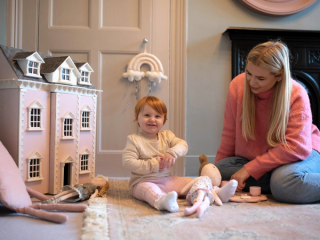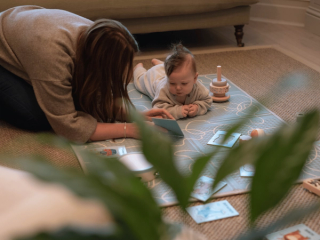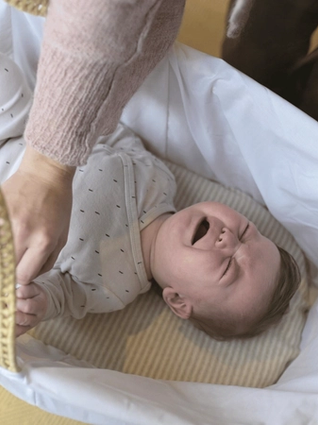
- Home
- Advice Hub
- Baby
- Bonding & Development
- Common Baby Sleep Challenges
Common baby sleep challenges
Sleep challenges are so common that every parent is likely to experience them to some degree, so you are certainly not alone. Our Sleep Expert, Laura, has got some tips to help you navigate them.
During the first year of your baby’s life, their sleep will change a lot! Along with the many transitions and developmental changes, there are a few common sleep challenges that you may experience. It’s easy to assume you’re doing something wrong, but don’t beat yourself up. These sleep challenges are so common that every parent is likely to experience them to some degree, so you are certainly not alone. We’ve got some tips to help you navigate them.
Parental preference
When a baby takes a preference to one particular care giver and struggles to fall asleep with anyone else, or become very distressed, we call this parental preference. This can be due to a variety of factors, such as attachment patterns, routines, or temperament. Parental preference can be exhausting and limiting for the preferred parent, as well as very difficult for the ‘non-preferred’ parent to handle.
You can improve this by doing some of the following;
- Encourage bonding with the other parent: It's important for both parents to be involved in the child's bedtime routine and to create opportunities for bonding. Encourage the other parent to spend quality time with the child throughout the day, such as playing games, reading books, or going for walks. This can help build a stronger bond and make bedtime easier.
- Gradually introduce: If your child is particularly resistant try gradually transitioning the other parent into the routine. Being around during the routine and then taking on certain parts such as putting them into the PJs or reading the story with the preferred parent still present. Next, try having them do some steps whilst the preferred parent steps out.
- Be consistent with the routine and expectations around bedtimes to help reduce anxiety and make bedtime more predictable for your baby.
- Be patient and understanding whilst acknowledging your child’s feelings. You can say things like ‘I know you miss Mummy/Daddy, it’s my turn to read your story tonight’ and follow through with that so your baby learns it’s OK!
Separation anxiety
Another common infant sleep problem is separation anxiety, which can peak at around 8-9 months of age and again at 12 months. You can support your baby through separation anxiety in a few ways.
- Avoid over tiredness by keeping an eye on wake windows. An over tired baby will be even more sensitive.
- Fill your child’s emotional tank by having special 1:1 time before and after sleep times and any other period of separation.
- Keep a consistent bedtime routine. This will help your child feel more secure as they know exactly what is coming next.
- Don’t sneak out of the room. It’s important that you build trust with your child, so either tell them you will stay with them until they are asleep or say goodnight and tell them you will check on them soon or see them in the morning.
False starts
False starts refers to when you put your baby to sleep at bedtime and they wake 45-60 minutes later, needing resettling. Often they will then also need resettling another few times during the first part of the night before finally settling down for a long stretch of sleep. False starts can be common during a period of illness; however, if your child is well in themselves there is likely a misalignment between the circadian rhythm (internal body clock) and sleep drive (how much sleep pressure has built up). This can happen as a result of either under or over tiredness and is usually a result of sleeps during the day needing adjustment.
For your child to be ready for sleep at bedtime and sleep a good stretch at night there needs to be enough sleep pressure built up before bedtime. If there’s not, your baby will sleep more lightly and therefore wake easily or be more restless during the first part of the night. This can happen due to a nap that’s too long or too close to bedtime, too much overall day time sleep for their age, or bedtime being too early. On the other hand your baby could be over tired, causing a build-up of cortisol, making resettling between sleep cycles more difficult.
Over tiredness will happen if your child’s window before bed was too long for their age or they have not had enough overall day time sleep. Try taking a look at your child’s sleep schedule to see if it needs to be tweaked a little. Once you make a change, it can take a few days to take effect on night-time sleep.
Split nights
A split night is where your baby wakes up during the night and stays awake for an hour or more. They’re not usually in distress, but seem ready to play! This is different to baby waking frequently but settling back to sleep, since it seems no matter what you do they just cannot fall back to sleep – even though it’s the middle of the night.
Usually, when this happens, it’s due to the two sleep drives becoming misaligned. What should happen is that sleep pressure (being sleepy!) puts your baby to sleep at bedtime and helps them sleep a good stretch, and then as sleep pressure dissipates the circadian rhythm needs to take over and help us sleep until morning.
In the case of split nights the circadian rhythm is not taking over and so baby wakes up for several hours until they have built up enough sleep pressure to fall asleep again. You can get into a bit of a cycle here as once baby eventually falls asleep they may then sleep in later in the morning, subsequently not nap well and need an early night. Before you know it your baby’s night is 14 hours long for example 6pm-9am, but with a big chunk of wake time in the middle!
The key is to establish a consistent wake and bedtime and focus on great naps during the day. An 11 hour night works well, for example 7:15pm – 6:15am and once you have made these schedule shifts and established good naps you should see changes within around 4-7 days, with baby sleeping through the night again.
Whatever challenges you are facing with your baby’s sleep, rest assured there will be a solution and a way to improve the situation for your whole family. If you feel you would benefit from more personalised support don’t hesitate to reach out to someone.
Advice & tips

Want to read more? Join the HiPP BabyClub for full access to this article.
As a BabyClub member, you'll get access to a range of exclusive benefits, including:
Monthly competitions
Discounts from our Partners
Expert advice tailored to your little one's age
Weaning recipes
HiPP shop discounts*
*10% off HiPP's online shop does not apply to our First Infant, Anti-Reflux or Comfort Formula Milk.
Important notice: Breastfeeding is best. Follow on milk should only be used as part of a mixed diet from 6 months. Talk to a healthcare professional.





